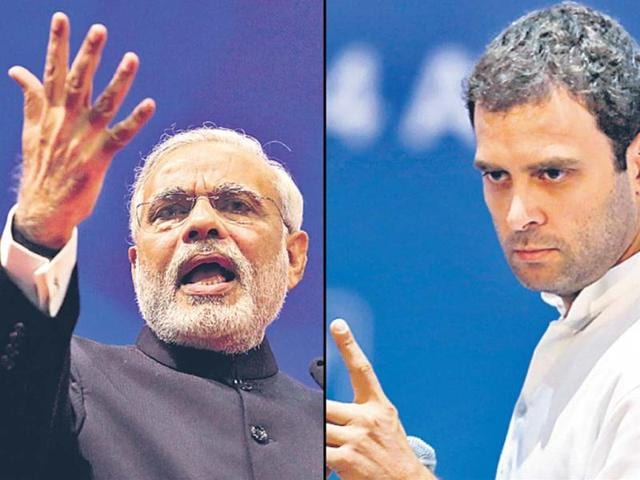PM Modi, Rahul Gandhi continue to deliver from old scripts
It was certainly a hot Sunday in the national capital with rising political temperatures. As Prime Minister Narendra Modi — back after his nine-day foreign tour — addressed BJP MPs at the Parliament’s Balayogi auditorium, Congress vice-president Rahul Gandhi — back after a six-week sabbatical — addressed farmers at the Ramlila Maidan, there was heightened suspense and expectation in political circles.
It was certainly a hot Sunday in the national capital with rising political temperatures. As Prime Minister Narendra Modi — back after his nine-day foreign tour — addressed BJP MPs at the Parliament’s Balayogi auditorium, Congress vice-president Rahul Gandhi — back after a six-week sabbatical — addressed farmers at the Ramlila Maidan, there was heightened suspense and expectation in political circles. On the eve of the Parliament session, will Modi, who is under attack from the opposition for what they call the government’s “pro-rich” policies, show any signs of wilting on the land bill? Or after his sabbatical, will Rahul give any indications of change in his approach — taking off the social activist’s hat to don something closer to young India’s dreams?

At the end of it though, all hype and expectations were belied as the two protagonists stuck to their familiar scripts. The sabbatical didn’t seem to have changed Rahul’s core beliefs. Political observers and experts may have come to accept the reality of “Modi wave” in the last Lok Sabha elections, but the Rahul attributed the BJP’s victory to industrialists to whom the PM was “indebted” to the tune of thousands of lakhs of crores. And it was time for the PM to return the favour by allowing them to acquire farmers’ land, was it political rhetoric or did Rahul really believe it?
Surely, he did as he was soon talking about his exploits in Bhatta Parsaul and Niyamgiri. There was obviously no recognition of the fact that the Congress got drubbings in the same areas one election after another.
As if anticipating Rahul’s line of attack, Modi who spoke at the BJP workshop about a couple of hours earlier, took the debate to a different level. He cited a host of his welfare schemes, linking his LPG subsidy initiative with the welfare of poor old women who still burn woods to cook and also with environment, citing the educational backwardness of Muslim girls in the context of his beti bachao, beti padhao scheme and sharing his vision to provide roof on everyone’s head. “Are we going to build a house for Mukesh Ambani?” he asked seeking to rebut the opposition’s allegations. There are some jitters in the BJP camp about the impact of the opposition’s attempt to project the NDA regime as “anti-poor”. But, Modi has been known to believe in the end-justifies-the-means adage and does not seem to be bothered about temporary political storms over land ordinance.
One expected Rahul to return from the sabbatical to recognise and respond to aspirational India, which abandoned his party in 2014. There was obviously no realisation that his party returned to power in 2009 not because of freebies and dole outs often packaged as schemes as some activists would have the Congress believe. The urban middle-class had decisively voted for the Congress in the 2009 elections as it spoke of their dreams and expectations. The party’s commitment to aspirational India was reflected by the way Dr Manmohan Singh put his government at stake over the Indo-US nuclear deal. In the elections, while the opposition harped on cash for votes, the Congress talked about energy security. The Congress is today left to crying foul about how Modi government has appropriated its schemes, icons and even the nuclear deal. In a reversal of roles, today’s Congress seems to be following the obstructionist tactics of the BJP when it was in the opposition during the UPA regime. And the ruling BJP is now brazening it out over the land bill the way the Congress was over nuclear deal.





